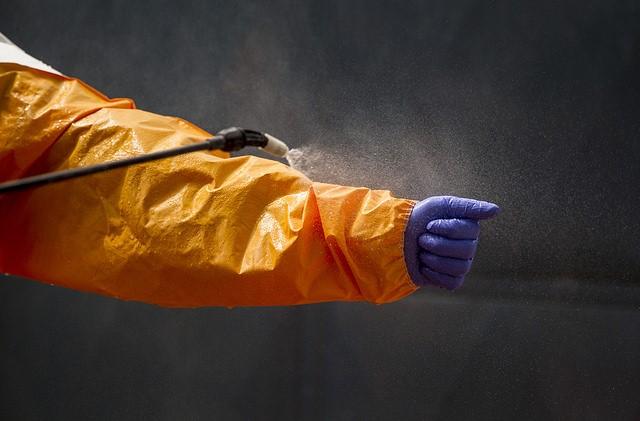Over the weekend and through today, the Democratic Republic of the Congo (DRC) reported 15 more Ebola cases, including 5 earlier probable infections from Komanda, one of the areas where responders had faced security challenges.
Also, the country's health ministry shed more light today on factors that have fueled a steep rise in cases in Katwa, which has become the current hot spot, and South Sudan today launched a campaign to immunize health workers and frontline responders with VSV-EBOV vaccine.
Case count climbs to 736
In the latest three daily updates, the latest cases were from a several locations. Of the 10 confirmed cases, 4 are in Beni, an area where cases have declined but was once the outbreak's epicenter. Two others are in Oicha, and four are in Katwa, the current hot spot.
The five probable cases in Komanda were added after investigations into deaths that occurred in November and December concluded that they were likely due to Ebola.
The new cases boost the overall outbreak total to 736 cases, which include 682 confirmed and 54 probable infections. In its update today, the ministry said health officials are still investigating 161 suspected Ebola cases.
Besides the 5 deaths in the earlier probable cases, the health ministry reported 8 more deaths, including 7 patients from Ebola treatment centers in Katwa, Butembo, and Mabalako. One of the deaths involved a patient from Oicha who died in the community.
The latest deaths push the outbreak's overall fatality count to 459.
Disruptions, reluctance in Katwa
In its update today, the DRC's health ministry said several factors have led to a significant increase in cases in Katwa this month, including local groups that have obstructed response activities such as immunization, household decontamination, and safe and dignified burials.
And despite broad community sensitization efforts, many Katwa residents continue to deny that Ebola exists, the ministry said. It added, "However, significant progress in community involvement in Katwa has been achieved, in particular through greater involvement of women's associations."
Also, demonstrations related to problems with the DRC's national election in late December brought the outbreak response to a standstill for several days, the ministry said, which resulted in a large drop in Ebola alerts that officials received and investigated. As a result, people with Ebola weren't quickly taken to Ebola treatment centers for care, and contacts weren't vaccinated.
Several "dead" days since the beginning of the year in Butembo and Katwa have also slowed the Ebola response. "When the response is slow, the risk of geographical expansion of the epidemic increases due to uncontrolled displacement of patients and their contacts," it said.
After the response interruptions, people who were contacts of confirmed cases moved and brought the virus to two new health zones in January: Mangurujipa and Kayina. And investigators found that Kayina's confirmed case-patients are members of a Katwa family who participated in the unsafe burial of a relative. Infections have been confirmed in 21 family members.
Officials push back against assertions
In an unusual step, the health ministry in its Jan 26 update disputed some information in a Jan 15 Foreign Policy article that discussed the challenges in the DRC's outbreak.
It said the article contained some "dubious and problematic" assertions, for example, that the health workers were threatened by soldiers, gangs, arms smugglers, and rapists. The health ministry clarified that most assaults and threats on responders have come from people the residents of Ebola-affected communities. It added that several Ebola cases have been detected in areas controlled by armed groups that have agreed to work with response teams to curb the outbreak.
The health ministry also said the article inappropriately linked possible sexual transmission in survivors and the use of rape as a weapon of war. It said no cases of "military rape or rape contamination" have been reported in outbreak areas and that there is no objective evidence to back up the assumption that "rapist and robber soldiers" could spread the virus.
The ministry said Ebola survivors and their families are being followed by clinical psychologists and that so far rape has not been mentioned as a source of trauma in populations affected by the outbreak.
South Sudan vaccine launch
In South Sudan, which has a border not far from the DRC's outbreak area, the health ministry and its partners today began vaccinating health workers and frontline responders against Ebola as part of larger preparedness efforts, according to a statement today from the World Health Organization (WHO) South Sudan office. Groups supporting the efforts include the WHO; Gavi, the Vaccine Alliance; UNICEF; and the US Centers for Disease Control and Prevention.
Vaccination began in Yambio in Gbudue state, and health workers in the cities of Tombura, Yei, Nimule, and South Sudan's capital city of Juba—all considered high-risk areas—will also be offered the vaccine.
The country has received 2,160 doses of VSV-EBOV from Merck.
Matshidiso Moeti, MD, the WHO's regional director for Africa, said in the statement, "It is absolutely vital that we are prepared for any potential case of Ebola spreading beyond the Democratic Republic of the Congo." The WHO said it has deployed more than 30 staff members to support preparedness efforts in South Sudan, has helped train 60 health workers, and established 17 screening points that have screened nearly 1 million people so far.
Gavi has assisted with the Ebola vaccine stockpile and has provided $2 million to support WHO vaccination efforts in countries that neighbor the DRC's Ebola-affected area.
In November, health officials launched a similar vaccination campaign in Uganda, one of the other neighboring countries.
See also:
Jan 26 DRC update
Jan 27 DRC update
Jan 28 DRC update
Jan 15 Foreign Policy article
Jan 28 WHO South Sudan office statement



















